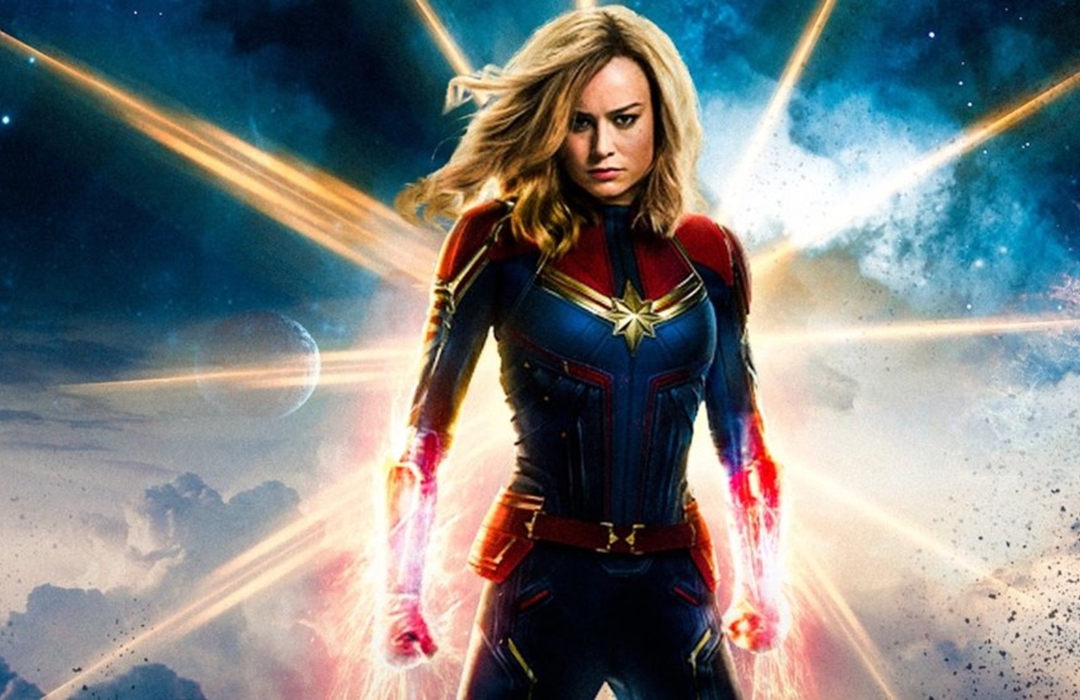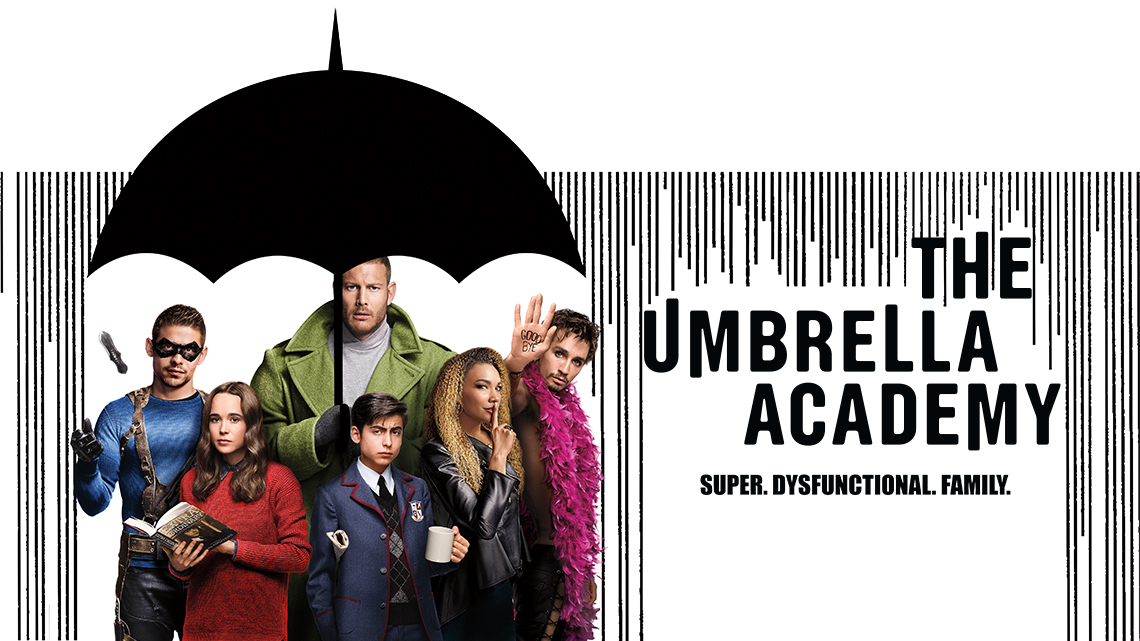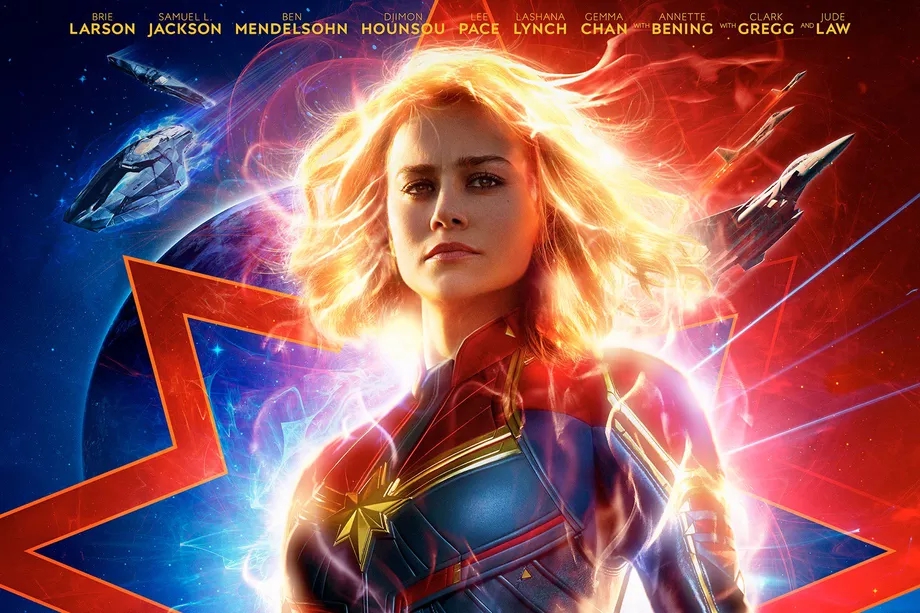
Both Captain Marvel (Marvel Studios) and Umbrella Academy (Netflix) offer keen critiques of the borderline-fascist notions of superhero might and specialness, and we would be remiss to ignore them.
by Teodor Reljić
Image: Brie Larson as Carol Danvers/Captain Marvel in Captain Marvel (Marvel Studios, 2019)
NOTE: This article contains spoilers for ‘Captain Marvel’ and the first season of ‘The Umbrella Academy’
[dropcap]F[/dropcap]riedrich Nietzsche is name-checked in the very first episode of The Umbrella Academy, the Netflix series adapted from the Gerard Way and Gabriel Ba comic book of the same name and which premiered with much critical fanfare in February 2019.
‘Nietzsche once said, “Man is as a rope stretched between the animal and the superhuman. A rope over an abyss. It is a dangerous crossing, a dangerous looking-back, a dangerous trembling and halting. As much as you must strive for individual greatness, and strive you must, for it won’t come to you of its own accord, you must also remember that there is no individual stronger than the collective.”
‘The Umbrella Academy’
The words are intoned by Sir Reginald Hargreeves (Colm Feore), an extreme caricature of the turn-of-the-century eccentric ‘man of science’ and patriarch of the Hargreeves household, which hosts his retinue of superpowered adoptive children, whom he drills into honing their exceptional genetic abilities into becoming a world-saving team along the lines of X-Men or The Avengers.

All except for Vanya (Ellen Page), who despite being a product of the same spontaneous immaculate birth that gave the world her siblings and herself, appears to have to no natural superpowers of her own, resorting to playing the violin semi-professionally and writing a resentful tell-all memoir about being left out from the Hargreeves ‘Umbrella Academy’—a move that alienates her from her already-dysfunctional siblings, apparently for good. As I will get into later on, the articulation of Vanya’s trauma throughout the series hints at the inherent, often hidden, abuse that belies the Übermensch narrative which powers many mainstream superhero narratives.
For while Reginald’s general overture towards the ‘collective’ suggests at the very least an appreciation of group labour over individual one-upmanship, both his callous behaviour towards his adoptive children as well as the overarching legacy of superhero fiction suggest a less generous reading. Like a steampunk Joe Jackson, Hargreeves is not the least bit interested in his children’s emotional wellbeing, a duty he tellingly shunts off to Grace (Jordan Claire Robbins), a robotic matriarch he Frankensteined into existence, while he continues to push and prod his children to perform elaborate world-saving missions, assisted all the while by the taciturn manservant Pogo. In this case, however, ‘manservant’ is a misnomer, as Pogo is in fact a hyper-intelligent talking monkey… an aesthetic choice that cements Sir Reginald Hargreeves even further into that telling archetypal fount of imperial exploitation and bigotry: the Victorian/Edwardian adventurer-scientist-explorer, keen to indulge in exoticism and the thrill of discovery while paying nary any attention to the social and emotional state of those around him.
Hargreeves is not the least bit interested in his children’s emotional wellbeing, a duty he tellingly shunts off a robotic matriarch he Frankensteined into existence, while he continues to push and prod his children to perform elaborate world-saving missions.
Though just one grotesque among many—apart from the apparently power-less Vanya, his children are completed by the super-strong and freakishly buff Luther (Tom Hopper), unhinged supernatural knife-thrower Diego (David Castañeda), reality-manipulating Allison (Emmy Raver-Lampman), drug-addled ‘walking seance’ Klaus (Robert Sheehan) and ‘Number Five’ (Aidan Gallagher), a dimension-hopper who ends up trapped in his young teenage body—Hargreeves is clearly pitched as an unambiguously reprehensible figure—one whose true north in life appears to be limited to making little Nietzchean Übermensch out of his kids.
Both the comic and the series—with Steve Blackman and Jeremy Slater adapting the source material for the popular streaming service—wisely position Vanya’s journey as the central one in the story, with the apocalyptic goings-on that animate the Big Stuff in the background often—aptly and successfully—taking a backseat to her internal turmoil, and a promise of personal redemption (or at least, a long-overdue bout of emotional healing) for someone who was little more than a discard for most of her life commands our attention despite the fireworks of what would traditionally be considered to be the ‘A’ storyline.
The emotional fall-out of being foregrounded against a superpowered elite does not often occupy much of the oxygen animating and surrounding the ubiquitous superhero narratives that surround us nowadays—the opposite is often true, with even a semi-parodic take like The Incredibles being taken to task for its apparent Randian implications— so Vanya’s plight makes for a refreshing change.
‘Captain Marvel’
However, the most recent ‘solo’ entry from Marvel Studios—by all accounts, the most powerful purveyor of superpowered media—also succeeds in poking some holes in the dehumanising logical end point of the pulp-Übermensch trope, by giving us a superheroine who reaches her apotheosis by swerving away from the brutish ‘becoming’ assigned to her by a militaristic fascist state that insists she become ‘the best version of herself’ by polishing her military prowess and stoically suppressing her emotions at every turn.

In Captain Marvel (2019), the person we later learn is former military pilot Carol Danvers (Brie Larson) is introduced to us as Vers, a novice fighter among the top military echelons of the Kree—an alien race locked in combat with their shape-shifting counterparts, the Skrulls. Mentored by Yon-Rogg (Jude Law), Veers suffers from what seem to be amnesiac flashbacks that hint at a former life on earth, where she eventually crash-lands (in the mid-nineties) while pursuing rogue Skrull agents.
Crossing paths with a younger version of S.H.I.E.L.D agent Nicholas Fury (Samuel L. Jackson), Vers soon discovers that everything she was told about herself was a lie. Yon-Rogg all but forced her into military alien servitude because of the powers she gained as the result of an accident, wiping her memory clean so as to ensure she’s useful to him as a weapon, and nothing more.
Though it hardly scales the heights of anti-fascist satire reached by Paul Verhoeven’s impressively impish (and woefully misunderstood) send-up of Robert Heinlein’s earnest sci-fi staple novel Starship Troopers (1997), Captain Marvel is to be commended for squarely choosing to swerve away from the ‘agon’ in favour of empathic understanding and triumph through friendship rather than sheer personal grit.
Deliberate or not, the Kree seem to be actively be calling attention to themselves as a fascistically efficient unit of soldiers, even if—strikingly enough—the quintet that ride alongside Vers at the beginning are racially diverse… albeit ‘greenwashed’ by their native Kree hue; something Jude Law’s military leader character Yon-Rogg does not appear to be afflicted by.
Indeed, the so-called ‘Starforce’ is presented as both a commendably polyvalent (to real-life ‘human’ audiences) gathering as well as being an efficient strike force in their own right. Tellingly, second-in-command is Korath, played by Djimon Hounsou… the Benin-born actor whom Hollywood is more than happy to use and re-use whenever they need an imposing-but-wise looking African actor in their ranks (Hounsou has operated across the divide, having already appeared in a bit part as an antagonistic military grunt in Marvel’s Guardians of the Galaxy, while playing the ‘wise wizard’ role in DC’s latest release Shazam!).
Meanwhile, Starforce’s sniper Minn-Erva is played by Chinese-British actress Gemma Chan, while the team is completed by Att-Lass (Algenis Pérez Soto) and Bron-Char (Rune Temte)—their interpreters from the Dominican Republic and Norway, respectively. Vers eventually rises above the oppressive, murderous regime ‘Starforce’ operate and thrive under—in one of the more inspired and glancingly post-colonial moves from Marvel Studios, it is the Kree who are revealed to be the oppressors to the Skrull, whom they’ve reduced to an itinerant refugee population—but her colleagues do not. Intentional or not, such a move hints at a subtle take-down of unexamined identity politics as a motor of salvation: it doesn’t matter that the coalition of characters ticks every box of ‘representation’; any radicalism is defanged if they are simply subsumed into a fascist military order.
It doesn’t matter that the coalition of characters ticks every box of ‘representation’; any radicalism is defanged if they are simply subsumed into a fascist military order.
We are of course more privy to Vers’ experience of this world—her teammates remain one-note cyphers that pop in and out during story-appropriate action set-pieces—and here we get a glimpse of how she’s drilled for greatness by Law’s Yon-Rogg. It is, significantly, a grilling that is characterised by a call for her to suppress all her ‘feminine’ qualities—Vers is often taken to task for showing too much emotion, her apotheosis as a warrior dangled as a carrot in front of her on a regular basis, if only she’d become that little bit less human. While this, in turn, may feel like kow-towing to the identity politics brigade, critiquing the suppression of the feminine and feminised is essential in revealing the dynamics of a fascist power structure.
Here, she finds an ally in the Umbrella Academy’s Vanya, whose exclusion from the superpowered elite leaves her resentful and scarred. But the two characters are similar for an even more significant reason: both of them were wilfully kept from discovering their full potential. Later on in the series, it transpires that Vanya does in fact have superpowers—only that they’re less obviously evident and that they’re also the most potent among the Academy… to a potentially dangerous extent, and so are kept a secret from her by the fearful Reginald Hargreeves. Vers, on the other hand, is Carol Danvers, whose powers lie dormant within her; the result of absorbing a piece of alien hardware that Yon-Rogg was attempting to intercept. He seizes upon the amnesia-addled Carol instead, manipulating her into a weapon to be employed by the Kree.
Against the Overmen
But while the more mainstream Captain Marvel unsurprisingly takes a more triumphant route with Carol’s journey —she harnesses her full powers and leaves Yon-Rogg literally in the dust—Umbrella Academy depicts the darker flip-side to a similar arc, showing Vanya’s resentment devolve into apocalyptic revenge. Manipulated once again by an apparently meek love interest (Leonard, played by John Magaro) who very much partakes of the Übermench philosophy and pushes Vanya into embracing the full extent of her powers, she is ultimately imprisoned by Luther —despite the protestations of the other siblings—leading her anger to reach a fever pitch and unleash the havoc Number Five escaped from the future to prevent.
Luther is the stereotypical ‘strongman’ of the group—literally referred to as Reginald Hargreeves’ ‘Number One’ in the Umbrella Academy, and something of a naive true-believer of their mission until the very end. Luther stuck around even after the rest of the kids had left the household—their father’s funeral leading to a forced reunion is in fact the inciting incident of the series—and he carries on his father’s legacy by imprisoning Vanya instead of helping her, despite having learnt that his father lied to him too, by sending him on a pointless mission to the moon for years. It’s a maddeningly poignant moment: a reminder of the toxicity of these power structures.
It should be added that both as a comic and a series, the Umbrella Academy stands as an example of a superhero counter-tradition that has already become more or less codified into the mainstream—going as far back as Alan Moore and Dave Gibbons’ groundbreaking maxi-series ‘Watchmen’ (1986), made into a film in 2009 by Zack Snyder, who would later go on to push his very-much-Übermenshy versions mainstream DC superheroes onto the big screen. A spin-off version of Watchmen is also set for the small screen, as HBO readies itself to capitalise on its legacy with what appears to be a ‘spiritual sequel’ to the source material that takes the realist revisionism at its core to comment on social and racial tensions in America, if the freshly-released trailer is anything to go by.
The Umbrella Academy stands as an example of a superhero counter-tradition that has already become more or less codified into the mainstream.
However, while the premise of the Watchmen comics was the innovative-at-the-time call to imagine what superheroes would be like if they operated in ‘the real world’—as opposed to the fictional Metropolises and Gothams of DC Comics and the retro-fitted and rejigged versions of US cities in Marvel Comics—the trope has since trickled down to accommodate less lofty narrative goals. Even the aforementioned Incredibles gets emphatic and comedic mileage from presenting its superhero family as ‘merely’ that: an average white, middle-class American family unit who just happen to have superpowers.
Other examples also abound, even drawing an international arc. James Gunn, who would later climb up the Marvel Studios hegemony by directing the studios’ breakout hit Guardians of the Galaxy (2014) and its sequel (2017), left a memorable mark in the small canon of ‘everyman superhero’ narratives with Super (2010), in which The Office’s Rainn Wilson decides to take on a drug dealer (Kevin Bacon) by becoming a super-power-less superhero, animated only by his quest to get his girlfriend (Liv Tyler) back.
Cleaving closer to the sensationalist ‘indie-mainstream’ where Super offered poignant insights amidst its moments of pitch-black humour (many of them enabled by Ellen Page—Umbrella Academy’s own Vanya—forcing herself into the role of Wilson’s female sidekick), Kick-Ass (also 2010) was adapted from the Mark Millar/John Romita Jr comic of the same name by Matthew Vaughn, and offered up a similar premise to Super, with perhaps a more potent through-line to adolescent vigilante power fantasies where Gunn’s film articulated melancholy mid-life mores.
More recently and certainly closer to home, Lo chiamavano Jeeg Robot (‘They Call Me Jeeg’—2015) offered an Italian twist on this burgeoning sub-genre, tapping into the the country’s intimate knowledge of anime to craft an everyman superhero named after a popular Japanese mecha-warrior character, who is in fact a low-life turned hero after falling into Rome’s Tiber river just as it’s become contaminated by radioactive waste — as pulpy an origin story as they come, and certainly free from the continuity-choked mythologies of the Marvel canon.
These stories are also significantly smaller in scale than Marvel Studios’ Avengers sagas, which scale Wagnerian heights of operatic ambition, a scope only widened with its latest missives, Avengers: Infinity War (2018) and the bookending chapter Avengers: Endgame (2019), for which Captain Marvel served as a pseudo-prologue.
While the utter dominance of superhero films on the big screen is sometimes pitched as a cause for concern, its multiplication may also hint at a multiplicity emerging.
But where the everyman superhero films offer a more ‘indie’-sized take on the genre, Umbrella Academy appears to be animated with the same independent spirit, but it is scaled back in tone, rather than narrative scope. After all, the overarching engine of the first season of the show—expanding upon the comic book’s inaugural six-issue arc, ‘Apocalypse Suite’—is nothing less than a race to save the world from complete annihilation. But as Vanya sets about on her world-destroying lash-out—enabled by the music that she has been quietly harnessing for all these years—it is not the destruction of the cities that you’re made to care about. Our attention is focused on the heartbreaking reality of a dysfunctional family coming close to reconciliation, only to come apart again as the spectre of their father re-emerges in the form of Luther’s dogged determination to stick to the patriarch’s programme.
All of this is to say that while the utter dominance of superhero films on the big screen is sometimes pitched as a cause for concern—an ominous acceptance of a monoculture having taken over—its multiplication may also hint at a multiplicity emerging. For an ironic, revisionist or parodic take on the superhero genre to exist and flourish, both creators and studio heads need to be confident in the knowledge that a wide-enough audience is familiar with the thing that is being deflated. It would be very difficult to get Watchmen without a generation’s worth of superhero narratives in comics.
In the same way, properties like Umbrella Academy can comfortably exist as an alternative wave to the prevailing trend, while even ‘within the system’, Captain Marvel is allowed to slip in an alternative pathway to what is traditionally offered up. Dismissing these creases in the prevailing narrative as mere iterations of ‘much of the same’ misses on their potential to be truly subversive—a notion that runs the risk of coming across as vulgar snobbery.
Paying attention to them could potentially yield to interesting rewards. If nothing else, the entertainment industrial complex is notoriously vulnerable to changing trends, and the tiresome attacks against Captain Marvel from the right-wing internet rabble is proof enough of the power these properties have to alter the course of the hegemony, in however faltering and small-scale a way as it may be.

Teodor Reljić is a writer of fiction, a freelance feature and copywriter, and culture editor and film critic at MaltaToday. His debut novel, Two, is published by Merlin Publishers. He has previously been published in Weird Fiction Review, Le Monde N’Est Pas Rond and Filmkrant. He has written MIBDUL, Malta’s very first serialized comic, which will be illustrated by Inez Kristina and launched in late 2019 through Merlin Publishers.
Leave a Reply